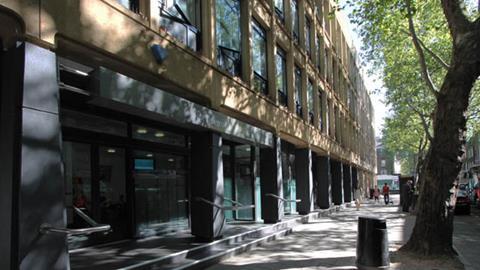Underlying profits at the University of Law more than halved last year as boardroom pay climbed at what was formerly the College of Law charity. But newly published accounts show that Britain’s first for-profit university has benefited handsomely from property sales, banking a £57m profit on disposals in 2015 alone.
Sales included the university’s prestigious Bloomsbury, London campus (pictured), which is understood to have fetched £68m. The university continues to lease the site.
The College of Law was acquired by private equity firm Montagu five years ago in a deal which created a £200m charitable fund for legal education. Cash was invested in the Legal Education Foundation, which awards grants mainly to charitable bodies.
The hived-off education and training business has changed hands again since then. In June 2015 it was sold to Netherlands-headquartered Global University Systems (GUS), which already owned the London School of Business and Finance.
Accounts for University of Law Ltd for the year to 31 July 2016 cover the first full trading period under the ownership of GUS.
Underlying profits (defined as earnings before interest, tax, depreciation and amortisation) fell from £17m in 2014/15 to £7m, while net revenue declined from £67.7m to £64.1m. The number of students on ULaw’s books at the year end stood at 6,880, up from 6,772 in 2015.
In the previous year ULaw’s balance sheet was bolstered by Montagu’s sale of freehold land and buildings, which generated a profit of £57.2m in 2014/15. No profits from similar transactions were posted in 2015/16, which helped turn a pre-tax profit of £31m in 2014/15 into a £26.6m loss last year.
Other disposals have included the sale of a freehold property in York following the relocation of operations to a new centre in Leeds. In 2014 a sale and leaseback deal was agreed on a site in Birmingham.
ULaw’s development as a private business has been accompanied by upheaval in the boardroom, with five chief executives in three years. Former airport executive David Johnston headed the business for less than a year after joining in August 2015. Johnston’s successor, economist Dr Stelios Platis, joined in April 2016 but stood aside after six months.
Platis’ successor is current CEO professor Andrea Nollent, who has also been ULaw’s vice-chancellor since last October. Other board members include Labour former minister Rt Hon the Lord Blunkett, who is chairman, and distinguished commercial lawyer Lord Grabiner.
A £300,000 compensation payment for loss of office to an unidentified director helped push total directors’ pay up from £1,291,000 in 2015 to £1,629,000 last year. The highest-paid director, whose identity is not disclosed, received £784,000. In 2015, the highest-paid director received £337,000, excluding exit bonuses on the sale of the business to GUS.
ULaw was held out by government as a model for other universities to follow to boost competition in the sector when it was spun off from the College of Law. The rebadging of the college marked the first time a for-profit company had been allowed to use the title ’university’. But some education sector observers were sceptical, comparing the Montagu deal to the kind of leveraged buyouts seen in Premier League football.
ULaw ended the 2015/16 financial year with 547 employees, 14 fewer than a year earlier and including 200 teaching staff. But the 2016 wage bill was down significantly, from £34.2m to £30.4m. The accounts stress that all staff are paid at least the national living wage, while contractor and sub-contractors receive at least the national minimum wage.
Writing in the annual report, Blunkett says that in 2015/16 ULaw continued to broaden its scope to include courses leading to business, finance and marketing qualifications. 'This is not to detract from its determination to remain a pre-eminent provider of quality legal education,’ he adds. In a report on strategy, meanwhile, professor Nollent outlines risks to the business. These include the SRA’s review of legal training, which will lead to a controversial new system of centralised assessment from 2020.




























2 Readers' comments